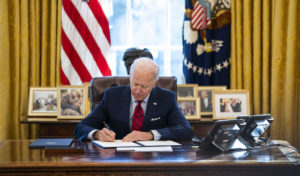
The U.S. Senate passes the Inflation Reduction Act of 2022, President Biden signs the CHIPS and Science Act of 2022, and more…
IN THE NEWS
- Vice President Kamala Harris cast the tie-breaking vote in the U.S. Senate to pass the Inflation Reduction Act of 2022, which the World Resources Institute has proclaimed contains “the most significant piece of climate legislation enacted in U.S. history.” The bill is set to come before the House of Representatives on August 12, 2022, where it is expected to pass before moving to President Joseph R. Biden for signing. The Biden Administration has issued a statement in support of the bill urging that the investment in energy security, revision of tax codes, and lowering of health care, prescription drug, and energy costs will help fight inflation. Preliminary estimates from the Penn Wharton Budget Model, however, predicted that the Act would increase inflation “very slightly” until 2024, then decrease it, resulting in an impact “indistinguishable from zero.”
- President Biden signed into law the CHIPS and Science Act of 2022. The bill authorizes investments in domestic manufacturing jobs and semiconductor research, development, and production. Semiconductors are the foundation of various items ranging from household appliances to defense systems. The bill also aims to support diversity and equity in science, technology, engineering, math, and innovation careers by providing additional resources to historically Black colleges and universities and other minority-serving institutions.
- The U.S. Food & Drug Administration (FDA) issued an emergency use authorization for the JYNNEOS vaccine in response to the rise in monkeypox cases. FDA approved the vaccine in 2019 to prevent smallpox and monkeypox infections in adults over 18 years old who are at high risk for those infections. The authorization will lead to an increase in the national vaccine supply by nearly 2 million doses by allowing the 400,000 vials of the vaccine in the federal government’s stockpile to be administered in smaller doses.
- Indiana Governor Eric J. Holcomb signed into law a near-total abortion ban, providing exceptions only for rape, incest, and in some cases, to preserve the life of the mother—making Indiana the first state to pass such restrictive abortion legislation since the Supreme Court’s Dobbs decision. Governor Holcomb stated that the law, which will take effect on September 15, 2022, accomplishes his goal of “protecting life.” White House Press Secretary Karine Jean-Pierre issued a statement condemning the Indiana law and recommending that Congress pass a bill to protect women’s right to abortion. Major Indiana employers, such as Cummins, also issued statements opposing the law, claiming that it will negatively impact business.
- The U.S. Department of Energy announced the creation of two new offices—the Grid Deployment Office and the Office of State and Community Energy Programs—“to modernize and expand capacity of the nation’s power grid and deploy cheaper, cleaner energy across America.” The effort is part of the Bipartisan Infrastructure Law’s investments in 100 percent clean electricity by 2030 and an economy with net zero carbon emissions by 2050. The Grid Deployment Office will focus on upgrading the electrical grid and energy-generating facilities, and the Office of State and Community Energy Programs will seek to reduce energy costs by partnering with states, Tribal nations, territories, local governments, school districts, and nonprofits.
- The U.S. Federal Communications Commission (FCC) issued a notice of inquiry seeking comment from the public on activities related to in-space servicing, assembly, and manufacturing. FCC Chair Jessica Rosenworcel stated that the FCC intends to refashion outdated regulatory frameworks for space policy and to promote U.S. leadership in the space economy. The notice stated that the FCC’s work on supporting in-space activities fits in with a White House Office of Science and Technology Policy strategy which encourages supporting this emerging commercial industry.
- The U.S. Federal Trade Commission (FTC) announced that it will seek public comment on possible new privacy rules to address how automated systems, which are often used for behavioral advertising and precision marketing, handle sensitive consumer data. One of two dissenting commissioners, Noah Phillips, criticized the request for public comment, arguing that Congress should take the lead on crafting federal privacy rules. FTC Chair Lina Khan, however, argued that market incentives have led to a “vast expansion” in how consumer data are used and that this expansive use justifies the Commission in seeking public input on how the FTC can address “harmful practices, specific harms to children, and algorithmic discrimination.”
- The U.S. Department of the Treasury’s Office of Foreign Assets Control sanctioned Tornado Cash, a virtual currency mixer that uses the Ethereum blockchain, concluding that it has been used in the laundering of over $7 billion in virtual currency since 2019. Currency mixers take stolen cryptocurrency and mix it with other people’s cryptocurrency, which enables actors to hide their laundered digital assets. The Treasury Department also added Tornado Cash to a Specially Designated Nationals List which prohibits transactions on the platform by persons in the United States without authorization. This designation was made pursuant to a regulation that blocks property used by a person in the United States to threaten U.S. national security, foreign policy, or economic health. The Coin Center, a cryptocurrency policy advocacy nonprofit, criticized the Treasury Department’s designation, calling the mixer a “neutral” automated tool that can be used for innocuous purposes. Paul Grewal, CEO of Coinbase, noted that this is the first time the Treasury Department has designated software as part of its blocklist.
WHAT WE’RE READING THIS WEEK
- In a Brookings Institution report, Jo Ann Barefoot, CEO of Barefoot Innovation Group, discussed the role that AI tools could play in enhancing financial regulation. Barefoot outlined how AI technology’s machine learning and natural language processing capacities can prevent money laundering and fraud and protect consumers from predatory lending. Barefoot then highlighted the risks associated with AI, including the problems of algorithmic bias, data quality, and data protection and privacy. Barefoot recommended that financial regulators educate and train their employees on technology knowledge and skills and that they center human decision-making in this education and training.
- In an article in the Yale Journal on Regulation, Zachary Liscow and Daniel Markovits, professors at Yale Law School, proposed a new “democratic” approach to behavioral law and economics. Liscow and Markovits argued that economists are not representative of the ordinary people governed by economic policy. They contended that this reality results in distorted policy outcomes skewed towards economists’ policy preferences rather than the public’s actual behaviors. Conversely, their democratic approach centers the public’s behaviors by integrating ordinary people’s opinions into the policymaking process alongside the technical expertise of economists. This approach, Liscow and Markovits declared, “empowers ordinary people to overcome their own biases and, working with expert helpers, to reassert control over their own lives.”
- In a working paper issued by the National Bureau of Economic Research, D. Mark Anderson, Kerwin Kofi Charles, Michael McKelligott, and Daniel I. Rees examined the milk industry in the late 1800s to show the effects of enforcing minimum quality standards on consumer health. Anderson and his coauthors found that employing standards, such as regular inspections, can improve consumer health. For example, one of the main dangers associated with milk consumption at that time was waterborne diseases from contaminated water. In the five years after inspections began, the number of infant deaths caused by waterborne diseases decreased by 12 percent, indicating that milk inspections had a positive impact on preventing death by waterborne illness, according to Anderson and his collaborators.
EDITOR’S CHOICE
- In an essay in The Regulatory Review, Cary Coglianese, professor at the University of Pennsylvania Carey Law School and director of the Penn Program on Regulation, and Mark Nevitt, a professor at Emory University School of Law, argued for U.S. government action to address the impacts of climate change. Coglianese and Nevitt called attention to how climate change amounts to a hidden tax that they argued justified passing sensible climate legislation to reduce. They argued that, so long as the U.S. government continues to do nothing about climate change, residents across the United States will be forced to pay the financial, social, and health costs of climate change, which include coping with and recovering from crop loss, flooding, fire damage, hurricane damage, and poor air quality.



